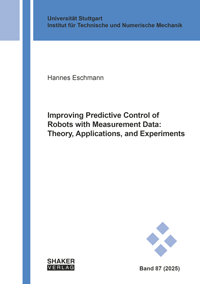
Shop : Details
Shop
Details
58,80 €ISBN 978-3-8440-9779-5Softcover170 pages59 figures241 g21 x 14,8 cmEnglishThesis
February 2025
Hannes Eschmann
Improving Predictive Control of Robots with Measurement Data: Theory, Applications, and Experiments
Robots have become an integral part of today’s manufacturing landscape. They are venturing into more and more areas of industry and society. However, initial setup times or costs can still hinder the large-scale employment of robotic systems for some applications. For model-based approaches, the model’s predictive quality usually directly translates to the performance one can achieve. Simple models grounded in first principles may face challenges in accurately capturing the relationship between input and output data. This thesis develops a learning-based framework for robotic systems. Gaussian process regression is used to learn systematic deviations from a nominal baseline model. Adjusting the nominal baseline model to input-output data collected during the robots’ runtime makes it possible to predict the robots’ future state evolution for a given input sequence with very high accuracy. This thesis focuses on applying high-accuracy trajectory tracking – a common task for robots in the modern industrial landscape. A robust predictive controller is employed to leverage the data-based robot model while adhering to the robots’ state and input limitations. A particular focus is put on the trade-off between exploiting the existing model for immediate performance gains and exploring for further model refinement. As more input-output data becomes available, the reference trajectory is adapted in an iterative fashion, lowering the tracking error while at the same time exploring previously unseen reference solutions, which improves the long term tracking performance. This thesis sets itself apart from other work in this field of research as rather than considering general robotic systems, omnidirectional mobile robots and, finally, robotic manipulators are a particular focus.
Keywords: robotics; Gaussian processes; control theory
Schriften aus dem Institut für Technische und Numerische Mechanik der Universität Stuttgart
Edited by Prof. Dr.-Ing. Peter Eberhard, Stuttgart
Volume 2025,87
Other formats
Electronic publication (PDF): 978-3-8440-9874-7
Export of bibliographic data
Shaker Verlag GmbH
Am Langen Graben 15a
52353 Düren
Germany
Am Langen Graben 15a
52353 Düren
Germany
Mon. - Thurs. 8:00 a.m. to 4:00 p.m.
Fri. 8:00 a.m. to 3:00 p.m.
Fri. 8:00 a.m. to 3:00 p.m.
Contact us. We will be happy to help you.



